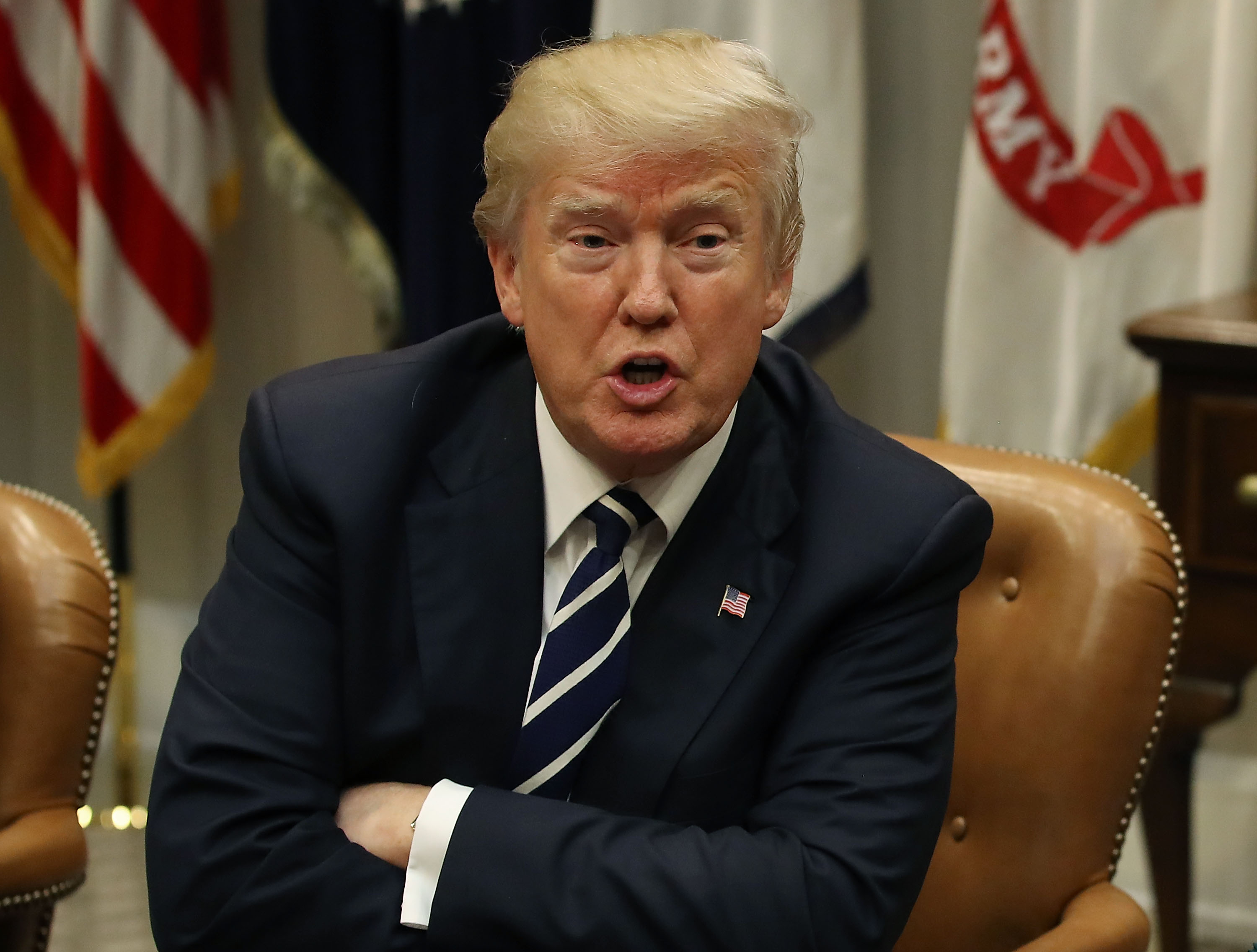10 things you need to know today: January 12, 2018
Trump faces backlash after insulting Haiti and African nations, the House rejects tighter limits on warrantless wiretapping, and more


- 1. Trump faces backlash over insulting comment toward Haiti, African nations
- 2. The House rejects limits on warrantless wiretapping
- 3. Reports: Trump decides to leave Iran deal in place, for now
- 4. Trump administration lets states impose Medicaid work requirement
- 5. Trump, facing protest threats, cancels visit to London
- 6. Facebook alters algorithm to favor posts from friends over companies
- 7. Walmart raises minimum wage, closes 10 percent of Sam's Clubs
- 8. Ecuador grants Julian Assange citizenship
- 9. Merkel's conservatives strike tentative coalition deal with Social Democrats
- 10. Trump to get first medical exam as president
1. Trump faces backlash over insulting comment toward Haiti, African nations
President Trump reportedly referred to Haiti, El Salvador, and African nations as "shithole countries" during a meeting with lawmakers seeking a bipartisan immigration deal protecting some undocumented immigrants from deportation. "Why are we having all these people from shithole countries come here?" Trump said, according to The Washington Post, which cited several people briefed on the meeting. Trump, who met with Norwegian Prime Minister Erna Solberg on Wednesday, said the U.S. should try to instead attract people from Norway and similar countries. Foreign diplomats and Haitian-American Rep. Mia Love (R-Utah) called for Trump to apologize, and a United Nations human rights spokesman called Trump's remark "racist." Trump denied using that language specifically, but the White House didn't deny Trump made the comment, saying the president "will always fight for the American people."
2. The House rejects limits on warrantless wiretapping
The House voted Thursday to extend for six years the National Security Agency's surveillance program, rejecting a bipartisan push to rein it in. The 256 to 164 vote renews an expiring law letting the government monitor electronic communication, without warrants, from foreigners abroad even if they are talking to U.S. citizens. The original 2008 law gave legal approval to the kind of once-secret warrantless surveillance started after the Sept. 11, 2001, terrorist attacks. The rejected effort to limit the surveillance would have required officials to obtain warrants in most situations when U.S. citizens' electronic messages are gathered during surveillance of foreigners abroad. The bill as passed does require warrants before reading Americans' emails. The matter now goes to the Senate.
The Week
Escape your echo chamber. Get the facts behind the news, plus analysis from multiple perspectives.

Sign up for The Week's Free Newsletters
From our morning news briefing to a weekly Good News Newsletter, get the best of The Week delivered directly to your inbox.
From our morning news briefing to a weekly Good News Newsletter, get the best of The Week delivered directly to your inbox.
3. Reports: Trump decides to leave Iran deal in place, for now
President Trump has decided to extend sanctions relief for Iran, leaving in place its 2015 nuclear deal with the United States and other world powers, for now, numerous news outlets reported. Trump is scheduled to announce the plan to waive the sanctions for another 120 days on Friday. Trump has threatened to scrap the deal, which he has called the "worst deal ever." He is expected to give U.S. lawmakers and U.S. allies in Europe a deadline for improving it as a condition for keeping it alive the next time it is up for recertification. He also could impose new targeted sanctions over Iran for its record on human rights.
4. Trump administration lets states impose Medicaid work requirement
The Trump administration issued guidelines Thursday that will allow states to impose work requirements on able-bodied Medicaid recipients. The first state likely to do so is Kentucky, where a waiver could be approved as soon as Friday. At least nine other states could soon follow. The administration argued that people who are unemployed have "poorer general health" and that "productive work and community engagement may improve health outcomes." Critics of the policy disagreed. "It's a little like saying that rain causes clouds," said the National Health Law Program's Leonardo Cuello. "It's more that people [with Medicaid] get care, which helps them be healthy and makes them able to work."
A free daily email with the biggest news stories of the day – and the best features from TheWeek.com
5. Trump, facing protest threats, cancels visit to London
President Trump tweeted Thursday that he had called off a planned visit to Britain for the opening of the new U.S. Embassy in London. Trump said the reason he canceled the trip was that he didn't want to be associated with the decision to sell the old embassy for "peanuts" and move it to an "off location." "Bad deal. Wanted me to cut ribbon-NO," he wrote. Critics in London said the real problem was that Trump faced likely protests in the U.K. "It appears that President Trump got the message from the many Londoners who love and admire America and Americans but find his policies and actions the polar opposite of our city's values of inclusion, diversity, and tolerance," London Mayor Sadiq Khan said.
The Washington Post The Guardian
6. Facebook alters algorithm to favor posts from friends over companies
Facebook said Thursday that it plans to change its algorithm to give its two billion users more content from friends and families, favoring it over news and brands. "We built Facebook to help people stay connected and bring us closer together with the people that matter to us," Facebook co-founder and CEO Mark Zuckerberg wrote. "But recently we've gotten feedback from our community that public content — posts from businesses, brands, and media — is crowding out the personal moments." The change marks a major shift from Facebook's long-held focus on user engagement, which has been credited with pushing its revenue to a record $34 billion last year. The change follows complaints that the old strategy spotlighted too much inflammatory and misleading content.
7. Walmart raises minimum wage, closes 10 percent of Sam's Clubs
Walmart announced Thursday that it would raise its minimum wage, citing the recent Republican tax reform bill as the catalyst. The company's U.S. employees will, starting in February, earn a minimum of $11 an hour. They currently get $10 an hour after completing training. The retailer will additionally offer more comprehensive parental leave benefits and disburse a one-time prorated bonus to certain workers. Skeptics noted that retailers are racing to raise wages to keep employees in a tightening job market. Rival retailer Target hiked its minimum to $11 an hour in October. The positive publicity from Walmart's move was muted when shortly after the announcement, the company said it would close 63 of its 650 Sam's Club warehouse stores, potentially eliminating thousands of jobs.
8. Ecuador grants Julian Assange citizenship
Ecuador has granted WikiLeaks founder Julian Assange citizenship, the South American country's foreign minister announced Thursday. Ecuador gave Assange asylum after he sought refuge in its London embassy in 2012, seeking to avoid being extradited to Sweden for questioning about an alleged rape. Sweden dropped the investigation because it couldn't interview Assange, but he has remained in the embassy for more than five years, fearing Britain will arrest him for jumping bail and send him to the U.S. to face espionage charges for leaking classified American documents. Britain's Foreign Office said naturalizing Assange "does not in any way change" his legal jeopardy in the U.K.
9. Merkel's conservatives strike tentative coalition deal with Social Democrats
German Chancellor Angela Merkel's conservatives reached a deal with the Social Democrats early Friday to a blueprint for formal coalition negotiations. If solidified, the agreement could end months of political uncertainty after Merkel's party emerged from September elections without enough parliamentary seats to easily form a new government, which raised questions about how long Merkel could stay in her job. Merkel turned to the left-leaning Social Democrats to renew their "grand coalition" after talks on a three-way coalition with the Greens and Free Democrats failed. The conservatives and Social Democrats reportedly agreed not to raise taxes if they form an alliance.
10. Trump to get first medical exam as president
President Trump is scheduled to go to Walter Reed military hospital in Bethesda, Maryland, on Friday for his first medical check-up as president. The routine exam will last several hours, and cover such things as Trump's blood pressure, cholesterol and blood-sugar levels, heart rate, and weight. The check-up comes following the release of a new book by author Michael Wolff, Fire and Fury, that says many Trump aides believe he is mentally unfit. Trump has dismissed such suggestions, declaring himself to be "a very stable genius." The White House said Trump's physical would not include a psychiatric examination, although assessments of cognitive status recently became covered in Medicare's annual wellness visits for seniors. Trump is 71.
Harold Maass is a contributing editor at The Week. He has been writing for The Week since the 2001 debut of the U.S. print edition and served as editor of TheWeek.com when it launched in 2008. Harold started his career as a newspaper reporter in South Florida and Haiti. He has previously worked for a variety of news outlets, including The Miami Herald, ABC News and Fox News, and for several years wrote a daily roundup of financial news for The Week and Yahoo Finance.
-
 What have Trump’s Mar-a-Lago summits achieved?
What have Trump’s Mar-a-Lago summits achieved?Today’s big question Zelenskyy and Netanyahu meet the president in his Palm Beach ‘Winter White House’
-
 The most anticipated movies of 2026
The most anticipated movies of 2026The Week Recommends If the trailers are anything to go by, film buffs are in for a treat
-
 The biggest viral moments of 2025
The biggest viral moments of 2025In the Spotlight From the Coldplay concert kiss cam to a celebrity space mission, these are some of the craziest, and most unexpected, things to happen this year
-
 10 things you need to know today: January 24, 2024
10 things you need to know today: January 24, 2024Daily Briefing Trump closes in on nomination with New Hampshire win over Haley, 'Oppenheimer' leads the 2024 Oscar nominations, and more
-
 10 things you need to know today: January 23, 2024
10 things you need to know today: January 23, 2024Daily Briefing Haley makes last stand in New Hampshire as Trump extends polling lead, justices side with US over Texas in border fight, and more
-
 10 things you need to know today: January 22, 2024
10 things you need to know today: January 22, 2024Daily Briefing DeSantis ends his presidential campaign and endorses Trump, the US and Arab allies push plan to end Gaza war, and more
-
 10 things you need to know today: January 21, 2024
10 things you need to know today: January 21, 2024Daily Briefing Palestinian death toll reportedly passes 25,000, top Biden adviser to travel to Egypt and Qatar for hostage talks, and more
-
 10 things you need to know today: January 20, 2024
10 things you need to know today: January 20, 2024Daily Briefing Grand jury reportedly convened to investigate Uvalde shooting response, families protest outside Netanyahu's house as pressure mounts for hostage deal, and more
-
 10 things you need to know today: January 19, 2024
10 things you need to know today: January 19, 2024Daily Briefing Congress averts a government shutdown, DOJ report cites failures in police response to Texas school shooting, and more
-
 10 things you need to know today: January 18, 2024
10 things you need to know today: January 18, 2024Daily Briefing Judge threatens to remove Trump from his defamation trial, medicine for hostages and Palestinians reach Gaza, and more
-
 10 things you need to know today: January 17, 2024
10 things you need to know today: January 17, 2024Daily Briefing The US strikes Houthi targets in Yemen a third time, Trump's second sex defamation trial begins, and more
